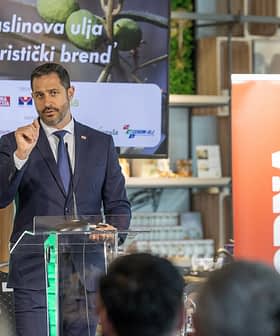Following more than three years of development, the results of the Predic 1 Operational Group’s work were presented last month at a conference in Mengíbar, Jaén.
The group’s remit was to deliver a platform capable of predicting olive harvests an entire season in advance, a goal they said they accomplished with an accuracy of up to 90 percent.
The work was carried out by a consortium comprising the University of Jaén, Cetemet, Citoliva, Cooperativas Agro-alimentarias de Andalucía, a farmers’ union, and Nutesca, using traditional Picual olive groves in Jaén, Córdoba and Granada as test cases.
See Also:Researchers in Andalusia Develop AI Tool to Improve Irrigation EfficiencyAccording to María Isabel Ramos, a professor at the University of Jaén’s Department of Cartographic, Geodetic and Photogrammetric Engineering and corresponding author of a 2022 study about the technology, predictive systems are crucial to the future of the olive sector.
“At the scientific level, crop harvest prediction is one of the most complex problems within precision agriculture,” she said. “There are several studies that make these predictions based on the close relationship between the emission of pollen and fruit production, others from aerobiological, phenological and meteorological variables, all with efficient and acceptable accuracies from July onwards.”
“We intend to advance this prediction and be able to make optimal predictions in the period before flowering… long before the farmer carries out their strategic planning and economic investment in the farm,” Ramos added.
The group used data mining methodologies previously used in predictive healthcare projects to create regression models from meteorological data and historical harvest data from across the initial target area.
This was combined with current data from drones equipped with thermographic sensors and multispectral cameras, satellite imagery, phenological assessments, foliar and soil analyses and data collected from model farms.
The model utilizes machine learning, the best-established field of artificial intelligence and one with a proven track record in agriculture, to predict crop yields as accurately as possible.
Using a support vector machine algorithm made it possible to use multiple kernels, namely the linear and Gaussian kernels. This makes it easier for the algorithm to adapt to the nature of the data, allowing infinite transformations to be carried out.
The platform will be freely available as a web-based application similar to SIGPAC, the Spanish government’s geographic information system for agricultural parcels.
See Also:Researchers Develop Algorithm to Predict Harvest Potential from Climate DataUsers can view an interactive graphical representation of the requested information and export the data.
Francisco Ramón Feito Higueruela, chair of computer graphics and geomatics at the University of Jaén and technical coordinator of the project, explained that as the number of users increases and the results of future harvests are fed back into the system, the accuracy of predictions will improve. More efficient models tailored to each area will be possible.
José Menar Pacheco of the Cooperativas Agro-alimentarias de Andalucía highlighted the importance of his organization’s role in disseminating the project results and knowledge to stakeholders.
He hopes to ensure broad awareness and adoption of the project’s findings to improve his members’ farm management and resource optimization. Those members account for more than €11 million in annual turnover and over 70 percent of Andalusia’s total olive oil production.
The project is financed through the European agricultural funds for rural development and the Andalusian regional government as part of the call for regional operational groups of the European Innovation Partnership in agricultural productivity and sustainability in the olive sector.
“Within the Common Agricultural Policy, a series of new reforms are being implemented, including the fight against climate change with these environmental objectives, as well as the achievement of a sustainable and competitive agricultural sector by supporting farmers, and all this with a strong commitment to the digitalization of the olive sector to achieve these objectives,” Ramos said.
She added, “The fulfillment of these objectives depends on the appropriate decision-making by each of the actors involved in the sector. Therefore, predictive systems are a crucial tool in management and decision-making.”









